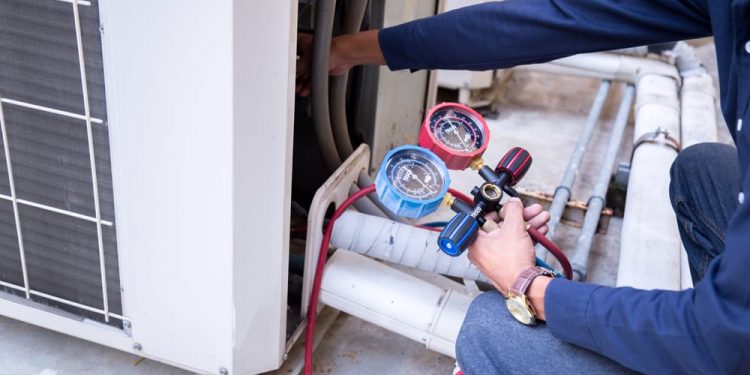Are you curious to know why your central air conditioner is leaking Freon? Freon leaks are different from water leaks since they are more dangerous for the health of the house’s inhabitants.
In addition, when the refrigerant is leaking, the air conditioner is not functioning correctly. You can figure out that Freon is leaking from different signs, but if you are not sure if your system is working correctly or not here, you can get additional assistance.
What are the signs of a Freon leak?
Even if you are not an expert, you can determine that your air conditioning system leaks Freon from different signs and clues. But remember that to fix problems with Freon, it might be necessary for the intervention of a trained technician.
Here are the main signs that your system is leaking Freon:
1. Inefficient cooling
When the refrigerant leaks, the one left inside the system is not enough to help transform hot air into cool air. The usual reaction is to set lower temperatures on the thermostat and make the system work harder than expected.
When the Freon gets too low, the air conditioner can stop producing cool air altogether, and if you get close to the system and try to feel the temperature of the air coming out, you will notice that it is warm.
Another sign that the refrigerant level is low is the fact that the house will take longer to cool down. You might notice that the environment is not cooling down at the same speed after turning on the air conditioner.
In general, the first culprit is the low refrigerant level.
2. Frozen coil
Another sign of refrigerant leaks is the frozen coil. The less efficiency of the air conditioner will prevent the condensation from getting in the drain pan and will instead freeze the coil. As a result, ice can build up on the copper lines too.
This is happening because the system will not be able to absorb as much heat as before and will end up in ice building up in specific places when the air conditioner is running. In addition, when the air conditioner is turned off, the ice will melt, causing an additional water leak.
3. Hissing sounds
The Freon can only leak because of cracks and holes in coils where the refrigerant circulates, and due to the pressure when the liquid leaks, you can hear hissing sounds coming from the air conditioner system.
If the leak or the hole is significant, you might even hear a bubbling or whining sound.
4. Air conditioner turning on and off
If the air conditioner turns on and off too often, then you might suspect that the refrigerant levels are too low and the system can’t manage to provide the cold air. As a result, it can malfunction and act weird such as turning on and off repeatedly.
5. Increased electric bill
If you see that your electric bill is higher than usual, then you can suspect that your air conditioner is not as efficient as it should be. This is because low refrigerant levels force the air conditioner to work harder and longer, consuming more electricity than usual.
6. Increased humidity
When the air conditioner is working correctly, it is normal to have a low humidity level since dehumidification is a result of the cooling process. However, if your home humidity is increased, you could suspect there is a problem with the HVAC system, and most probably Freon is leaking.
7. Unusual smell
The smell can be a sure indication of liquid leaking from the air conditioner system. For example, if you smell a sweet chloroform-like odor, you can suspect that the Freon is leaking from the system.
If you are not using Freon, other types of refrigerants could be odorless, so you have to keep an eye on the rest of the signs.
What causes Freon leaks?
Freon can leak for various reasons ranging from improper installation to holes and many other reasons. Here are some of the most common causes of Freon leaks:
- Improper installation
- Physical damage
- Corrosion
- Weak connections
- Normal wear and tear (age)
- Formaldehyde corrosion
If the air conditioning system is not installed correctly, it can cause Freon leaks—for example, a lousy job in soldering and sealing. Poor sealing can make Freon escape from small cracks or holes.
Any type of physical damage due to accidents or other reasons can cause holes or other problems leading to Freon leaks. Formaldehyde corrosion is another reason for leaks. For example, the acid can create tiny holes in the air conditioner from which the Freon can leak.
It is usual for an HVAC system to experience corrosion since it is composed of copper tube walls. Copper is very susceptible to corrosion that forms cracks and openings. Furthermore, with time the joints get worn out, causing leaks.
Last but not least, an air conditioner may have factory defects such as poor assembly, damaged parts, or missing components. Fortunately, you can take advantage of the warranty to resolve the problem.
Remember that wear and tear can also cause leaks. If the system is used a lot, it can accelerate the deterioration of its components, but it is customary to expect problems after many years of operations. Annual maintenance can prolong the system’s life and prevent leaks.
Health risk associated with Freon leaks
Freon leaks are not a problem only for the efficiency of the air conditioner system but can affect the health of the people living in the house. Freon is poisonous to people and can create symptoms in people affected by it.
Here are some of the symptoms caused by Freon poisoning:
- Headaches
- Dizziness
- Trouble breathing
- Nausea
- Coughing
The symptom can manifest mildly or intensively depending on how much Freon has been inhaled.
Conclusion
Your air conditioner can be subject to leaks and can deplete the Freon. In addition, low refrigerant levels are dangerous for the system since they can wear out faster and even break down while operating at a low level of efficiency.
However, Freon leaks can be dangerous and poisonous. Therefore it should be taken care from a trained technician.


















